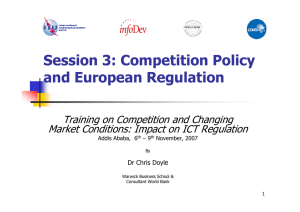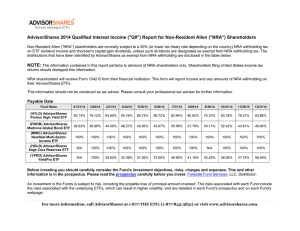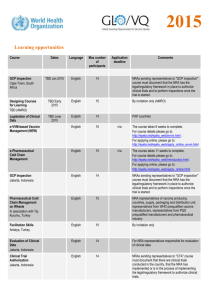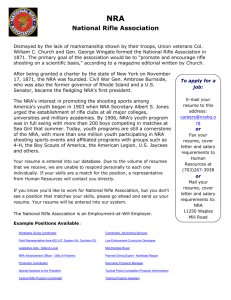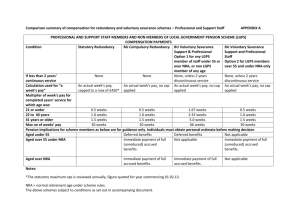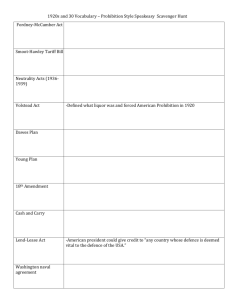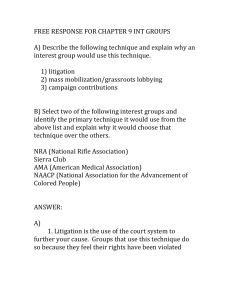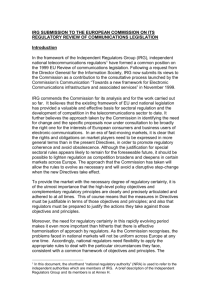The National Regulatory Authorities and the Notification Procedure
advertisement
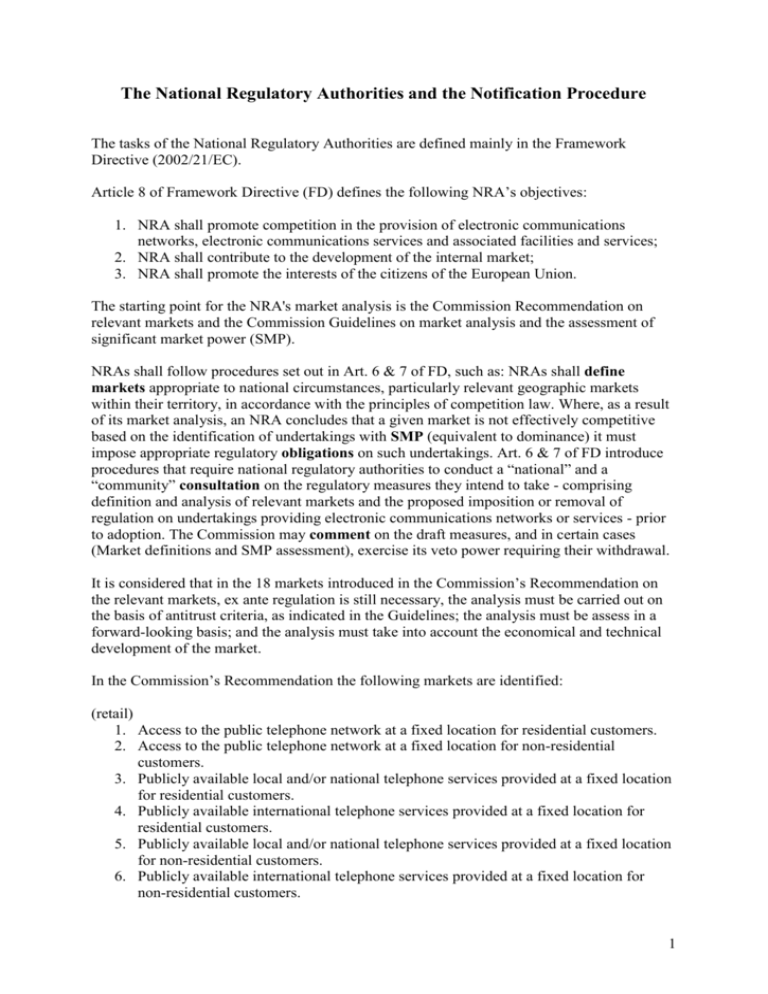
The National Regulatory Authorities and the Notification Procedure The tasks of the National Regulatory Authorities are defined mainly in the Framework Directive (2002/21/EC). Article 8 of Framework Directive (FD) defines the following NRA’s objectives: 1. NRA shall promote competition in the provision of electronic communications networks, electronic communications services and associated facilities and services; 2. NRA shall contribute to the development of the internal market; 3. NRA shall promote the interests of the citizens of the European Union. The starting point for the NRA's market analysis is the Commission Recommendation on relevant markets and the Commission Guidelines on market analysis and the assessment of significant market power (SMP). NRAs shall follow procedures set out in Art. 6 & 7 of FD, such as: NRAs shall define markets appropriate to national circumstances, particularly relevant geographic markets within their territory, in accordance with the principles of competition law. Where, as a result of its market analysis, an NRA concludes that a given market is not effectively competitive based on the identification of undertakings with SMP (equivalent to dominance) it must impose appropriate regulatory obligations on such undertakings. Art. 6 & 7 of FD introduce procedures that require national regulatory authorities to conduct a “national” and a “community” consultation on the regulatory measures they intend to take - comprising definition and analysis of relevant markets and the proposed imposition or removal of regulation on undertakings providing electronic communications networks or services - prior to adoption. The Commission may comment on the draft measures, and in certain cases (Market definitions and SMP assessment), exercise its veto power requiring their withdrawal. It is considered that in the 18 markets introduced in the Commission’s Recommendation on the relevant markets, ex ante regulation is still necessary, the analysis must be carried out on the basis of antitrust criteria, as indicated in the Guidelines; the analysis must be assess in a forward-looking basis; and the analysis must take into account the economical and technical development of the market. In the Commission’s Recommendation the following markets are identified: (retail) 1. Access to the public telephone network at a fixed location for residential customers. 2. Access to the public telephone network at a fixed location for non-residential customers. 3. Publicly available local and/or national telephone services provided at a fixed location for residential customers. 4. Publicly available international telephone services provided at a fixed location for residential customers. 5. Publicly available local and/or national telephone services provided at a fixed location for non-residential customers. 6. Publicly available international telephone services provided at a fixed location for non-residential customers. 1 7. The minimum set of leased lines (wholesale) 8. Call origination on the public telephone network provided at a fixed location. 9. Call termination on individual public telephone networks at fixed location 10. Transit services in the fixed public telephone network. 11. Wholesale unbundled access to metallic loops and sub-loops 12. Wholesale broadband access. 13. Wholesale terminating segments of leased lines. 14. Wholesale trunk segments of leased lines. 15. Access and call origination on public mobile telephone networks 16. Voice call termination on individual mobile networks. 17. National market for international roaming on public mobile networks 18. Broadcasting transmission services, to deliver broadcast content to end users Markets must be identified from a product/service point of view and from a geographical point of view; in the first case, NRA must identify which product/service are to be considered in the same market; and from a geographical point of view, NRA has to identify the geographical scope of the market (local, regional, national). In respect of each identified product and geographic markets, NRAs will assess whether the competition is effective. A finding that effective competition exists on a relevant market is equivalent to a finding that no operator enjoys a single or joint dominant position on that market. An undertaking “shall be deemed to have significant market power if, either individually or jointly with others, it enjoys a position equivalent to dominance, that is to say a position of economic strength affording it the power to behave to an appreciable extent independently of competitors customers and ultimately consumers“. → The new framework has aligned the definition of SMP with the Court's definition of dominance within the meaning of Article 82 of the EC Treaty. Following the competition analysis, NRA shall impose, maintain, amend or withdraw, as appropriate, of specific regulatory obligations on undertakings designated as having SMP. The specific regulatory obligations which may be imposed on SMP undertakings can apply both to wholesale and retail markets. In principle, the obligations related to wholesale markets are set out in Articles 9 to 13 of the Access Directive. The obligations related to retail markets are set out in Articles 17 to 19 of the Universal Service Directive. The obligations set out in the Access Directive are: transparency (Article 9); nondiscrimination (Article 10); accounting separation (Article 11), obligations for access to and use of specific network facilities (Article 12), and price control and cost accounting obligations (Article 13). The obligations set out in the Universal Service Directive are: regulatory controls on retail services (Article 17), availability of the minimum set of leased lines (Article 18 and Annex VII) and carrier selection and pre-selection (Article 19). If an NRA finds that a relevant market is subject to effective competition, it is not allowed to impose obligations on any operator on that relevant market. If the NRA has previously 2 imposed regulatory obligations on undertaking(s) in that market, the NRA must withdraw such obligations. Where the NRA proposes to remove existing regulatory obligations, it must give parties affected a reasonable period of notice. NRAs must impose at least one regulatory obligation on an undertaking that has been designated as having SMP. If an undertaking was previously subject to obligations under the 1998 regulatory framework, the NRA must consider whether similar obligations continue to be appropriate under the new regulatory framework. If the undertaking is found to have SMP in a relevant market under the new framework, regulatory obligations similar to those imposed under the 1998 regulatory framework may therefore be maintained. Procedure: (Article 7 of the Framework Directive) 1. Market analysis must start with asking operators to provide information. Request of information must be proportionate, motivated, and business secrets must be respected (confidential information); 2. After having carried out the market analysis, NRA shall do a national consultation with all operators, which have 30 days to submit comments in the draft measure. 3. After this consultation, the draft measure must be submitted to the National Competition Authority, which has 45 days to comment. 4. At the end of these consultations, NRA must submit the draft measure to the Commission and other NRAs which have minimum 30 days to comment; 5. If Commission find out that the decision would create a barrier to the single European market or Commission has serious doubts as to the compatibility of the draft measure with Community law, the adoption of the measure must be delayed by a maximum of an additional two months. 6. During this period, Commission may, after consulting the Communications Committee, take a decision requiring the NRA to withdraw the draft measure; 7. The Commission's decision will be accompanied by a detailed and objective analysis of why it considers that the draft measure should not be adopted together with specific proposals for amending the draft measure. If the Commission does not take a decision within that period, the draft measure may be adopted by the NRA. 8. (In exceptional circumstances, NRAs may act urgently in order to safeguard competition and protect the interest of users. An NRA may therefore adopt proportionate and provisional measures without consulting either interested parties. Where an NRA has taken such urgent action, it must, without delay, communicate these measures, with full reasons, to the Commission, and to the other NRAs. The Commission will verify the compatibility of those measures with Community law and in particular will assess their proportionality in relation to the policy objectives of Article 8 of the Framework Directive.) 9. (If the NRA wishes to make the provisional measures permanent, or extends the time for which it is applicable, the NRA must go through the normal consultation procedure set out above.) 10. Once an NRA's decision has become final, NRAs should notify the Commission of the names of the undertakings that have been designated as having SMP and the obligations imposed on them 3

